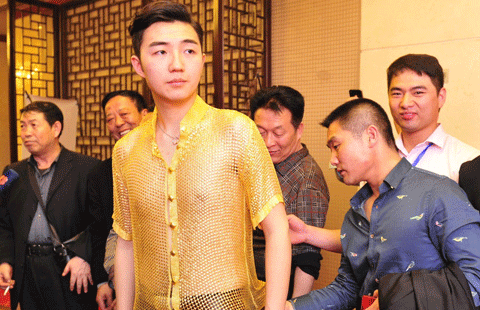US benefits from high-level engagements with China: Lew
Updated: 2015-04-06 04:44
By LIA ZHU in San Francisco(China Daily USA)
|
||||||||
 |
|
The US Treasury Secretary Jacob Lew speaks at a meeting held on Tuesday in San Francisco after returning from a two-day visit to Beijing. The meeting is held by Asia Society, a nonprofit organization dedicated to educating the world about Asia and attended by around 100 business representatives in the Bay Area. [LIA ZHU/CHINA DAILY] |
The US Treasury Secretary Jacob Lew said that Americans have benefited from China's contributions to the bilateral economic development and that the United States welcomes China having a significant role in global economics.
"I returned today from meetings in Beijing, where I had frank and constructive conversations with Chinese leaders about the state of our two economies, the bilateral issues we face," Lew said while addressing a meeting in San Francisco on March 31 after returning from a two-day visit to Beijing.
The US-China Strategic and Economic Dialogue and other high-level engagements have produced "real results" for the American people, as China has been making efforts to increase imports from the US, appreciate the yuan and commit itself to negotiating a Bilateral Investment Treaty, Lew said. He spoke to some 100 executives of Silicon Valley-based companies and businesses who attended the meeting held by Asia Society, a nonprofit organization dedicated to educating the world about Asia.
"Since early 2009, US exports of goods to China have roughly doubled, growing much faster than our exports to the rest of the world," he said. "Last year, the United States exported around $166 billion in goods and services to China."
He also emphasized China's efforts to appreciate the yuan and its commitment to enhancing the transparency of reserve data, such as the adoption of the IMF standards for data reporting, he told the audience.
Chinese President Xi Jinping told the G20 Summit last November that China would subscribe to the Special Data Dissemination Standard of the International Monetary Fund (IMF) for reporting foreign-exchange reserves.
"Since China de-pegged its exchange rate from the dollar in 2005, the RMB has appreciated approximately 33 percent," he said. "Since 2010, the RMB has appreciated approximately 20 percent on a trade-weighted basis."
Another result brought about by the two countries' high-level engagement is a bilateral agreement on expanding the Information Technology Agreement and the negotiation of a Bilateral Investment Treaty (BIT), according to Lew.
Under the BIT, US firms "would be treated like Chinese firms and given non-discriminatory market access, subject only to a specified list of exceptions".
"China's commitment to negotiate on the premise of non-discrimination, fairness, openness, and transparency offers a substantial opportunity to promote investment, and if achieved, will help level the playing field for American businesses to invest and compete in China," the treasury secretary said.
But he also said the list of exceptions, or "negative list", should be "short, limited in scope and narrowly defined".
As to the China-initiated Asia Infrastructure Investment Bank, the treasury secretary said the US "welcomes new additions to the international development architecture," and he also encouraged China to "maintain and advance high standards in institutions" as the two countries "work together to address the challenges of the 21st century".
Chinese Presdient Xi Jinping said while addressing the annual conference of the Boao Forum for Asia on March 28 that China will "advance complementary and coordinated development between the Asian Infrastructure Investment Bank and such multilateral financial institutions as the Asian Development Bank and the World Ban".
"We are happy to see the US' welcoming attitude toward the new bank," said Stephanie Xu, president of US-Asia Innovation Gateway, a non-profit corporation based in Silicon Valley and committed to advancing economic opportunities and investment between Asia and the US.
"The AIIB is aimed at promoting innovation and developing infrastructure projects in Asia, which will create more job opportunities and economic growth of the developing countries," she said.
"The progress of innovation and financial exchanges is unstoppable by some country or individual," Xu said.
liazhu@chinadailyusa.com

 Former president Fidel Castro appears in public in Cuba
Former president Fidel Castro appears in public in Cuba
 Now and then: Changing funeral trends
Now and then: Changing funeral trends
 Chinese honor war heroes on Tomb Sweeping Day
Chinese honor war heroes on Tomb Sweeping Day
 Lunar eclipse turns the moon 'blood red'
Lunar eclipse turns the moon 'blood red'
 2015 New York International Automobile Show kicks off
2015 New York International Automobile Show kicks off
 Ancient 'Xiangshi' kicks off in Wuzhen
Ancient 'Xiangshi' kicks off in Wuzhen
 Golden moments at jewelry show
Golden moments at jewelry show
 Luoyang, the ancient capital of thirteen dynasties
Luoyang, the ancient capital of thirteen dynasties
Most Viewed
Editor's Picks

|

|

|

|

|

|
Today's Top News
China promotes eco-friendly burials
US benefits from high-level engagements with China: Lew
China to develop city clusters along middle reaches of Yangtze
HK commemorates 25th anniversary of Basic Law
Family consent not needed to donate corpse for research in Guangzhou
Xi plants roots of
green awareness
Li backs firms' global vision
China to standardize energy conservation by 2020
US Weekly

|

|






